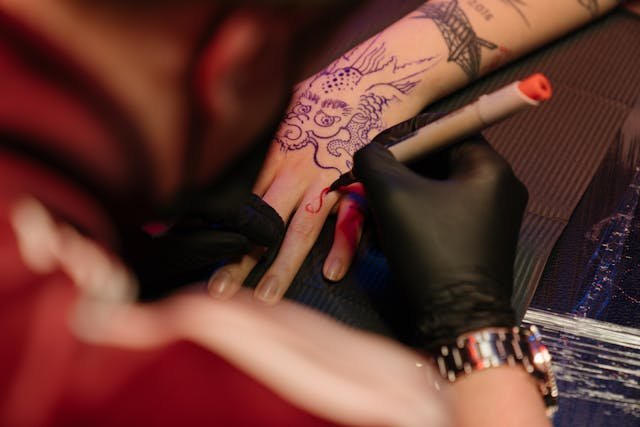In the diverse world of body art, Chinese tattoos stand out for their profound symbolism, elegant designs, and deep-rooted connections to a rich cultural heritage. These tattoos encompass a wide array of symbols, from the natural elements to mythical creatures, each carrying its unique meaning and significance. In this article, we will give you information on 20+ Chinese Tattoos For Females With Meaning.
Whether it’s the resilience symbolized by bamboo, the purity represented by the lotus flower, or the strength and protection depicted through the Fu Dog, Chinese tattoos offer individuals a way to express their personal stories, values, and aspirations. Beyond mere decoration, these tattoos are a form of personal expression that intertwines the wearer’s identity with the timeless wisdom and aesthetic beauty of Chinese culture. As we explore the meanings behind these captivating designs, it becomes clear that each tattoo is not just an art form, but a narrative woven into the skin, revealing insights into the wearer’s soul and the universal truths of life.
Chinese Tattoos For Females
Lotus (莲花 – Liánhuā)
The lotus flower holds a sacred place in Chinese culture, symbolizing purity and spiritual awakening. Despite growing in muddy water, it blooms immaculately. This represents the idea of remaining untouched by the impurities of life and emerging stronger and more beautiful. It’s a powerful symbol for women who have overcome difficulties or are seeking a path of enlightenment and purity in their lives.
Phoenix (凤凰 – Fènghuáng)
The phoenix, a mythical bird in Chinese mythology, embodies femininity, resilience, and rebirth. It is said to rise from its ashes, stronger than ever, symbolizing the ability to overcome life’s trials and emerge victorious. For women, a phoenix tattoo can signify transformation, the end of a chapter, and the start of a new one with strength and grace.
Also read: Tattoos With Meaning
Also read: 55+ Arrow Tattoo Meaning
Check Small Tattoos With Deep Meanings
Yin Yang (阴阳 – Yīnyáng)
The yin yang symbol represents the ancient Chinese understanding of how opposites or seemingly contrary forces are interconnected and interdependent in the natural world. It embodies balance, harmony, and the cyclical nature of life. For a female, this tattoo might symbolize the search for balance within oneself and the universe, embracing both the feminine (yin) and masculine (yang) aspects of her nature.
Check Small Arm Tattoos for Guys with Meaning
Dragon (龙 – Lóng)
In Chinese culture, the dragon is a symbol of power, strength, and good fortune. Unlike Western mythology, where dragons are often seen as malevolent, Chinese dragons are benevolent creatures. A dragon tattoo for a woman can signify her strength, courage, and the protective nature towards those she cares for. It also represents wisdom and a strong will, the ability to face challenges head-on.
Butterfly (蝴蝶 – Húdié)
Butterflies are symbols of transformation, beauty, and the transient nature of happiness. In Chinese culture, they also symbolize love and a long-lasting bond between lovers. A butterfly tattoo can represent personal growth, change, and the ability to go through life’s challenges with grace and lightness. It’s a celebration of life’s changes and the beauty found in transformation.
Bamboo (竹 – Zhú)
Bamboo is revered in China for its strength, flexibility, and resilience. It can bend under the mightiest of storms but rarely breaks. This symbolizes the ability to adapt and withstand life’s hardships without losing one’s integrity. For women, a bamboo tattoo might represent strength of character, enduring growth, and the ability to adapt to life’s changes with grace.
Cherry Blossom (樱花 – Yīnghuā)
Cherry blossoms are a poignant reminder of the fleeting nature of life, beauty, and the ephemeral nature of existence. In Chinese culture, they symbolize love, beauty, and the strength to face a new beginning. For females, a cherry blossom tattoo might reflect a sense of life’s preciousness, the beauty of being alive, and the courage to face the impermanence of life with dignity.
Koi Fish (锦鲤 – Jǐnlǐ)
Koi fish are admired for their determination as they swim upstream against the current. In Chinese culture, they symbolize perseverance, strength in adversity, and the ability to achieve high goals. For women, a koi fish tattoo can represent personal growth, overcoming obstacles, and the courage to swim against the tide to achieve one’s dreams.
Fu Dog (瑞獅 – Ruìshī)
Fu Dogs, also known as Chinese guardian lions, symbolize protection, strength, and courage. They are traditionally placed in front of Chinese imperial palaces, temples, and homes to guard against negative energy. A tattoo of a Fu Dog can signify a protective nature, bravery, and safeguarding oneself against misfortune. It’s a powerful emblem for those seeking strength and protection in their lives.
Peony (牡丹 – Mǔdān)
The peony, known as the “king of flowers” in Chinese culture, symbolizes wealth, prosperity, and beauty. It also stands for honor, good fortune, and a happy marriage. A peony tattoo can represent the wearer’s aspirations for prosperity, the richness of life, and the beauty in living. It’s especially popular among women for its associations with femininity and elegance.
Chinese Calligraphy (书法 – Shūfǎ)
Chinese calligraphy tattoos can range from single characters to phrases or even longer poems. Each character or phrase is chosen for its meaning, such as love (爱 – Ài), strength (力量 – Lìliàng), peace (和平 – Hépíng), or wisdom (智慧 – Zhìhuì). These tattoos are deeply personal, as the wearer selects words that resonate with their life philosophy or aspirations.
Double Happiness (双喜 – Shuāngxǐ)
The Double Happiness symbol is a traditional Chinese symbol for marital bliss and joyous unions. It’s often used at weddings. As a tattoo, it can symbolize the joy of living, the pursuit of happiness, or a hopeful blessing for a happy relationship. This makes it a popular choice among those celebrating love, marriage, or the desire for a joy-filled life.
Chinese Zodiac Signs (生肖 – Shēngxiào)
The Chinese zodiac consists of twelve animals, each representing a year in a -year cycle. People often choose tattoos of their zodiac animal sign (such as Dragon, Snake, Horse, etc.) as they are believed to embody the characteristics of the sign. These tattoos can signify self-identification, birth year, or the qualities one shares with their zodiac sign, such as loyalty, bravery, or wisdom.
Green Tea (绿茶 – Lǜchá)
Green tea, a vital part of Chinese culture and daily life, symbolizes purity, tranquility, and health. A tattoo of green tea leaves or a traditional tea set can represent a love for nature, a peaceful state of mind, and the importance of self-care and health.
Red Lantern (红灯笼 – Hóngdēnglong)
Red lanterns are a symbol of festivity, celebration, and good fortune. They are commonly seen during the Chinese New Year and other celebrations. A tattoo of a red lantern can symbolize light in the darkness, hope, and the joy of life. It’s a reminder of celebratory times and the warmth of family and community.
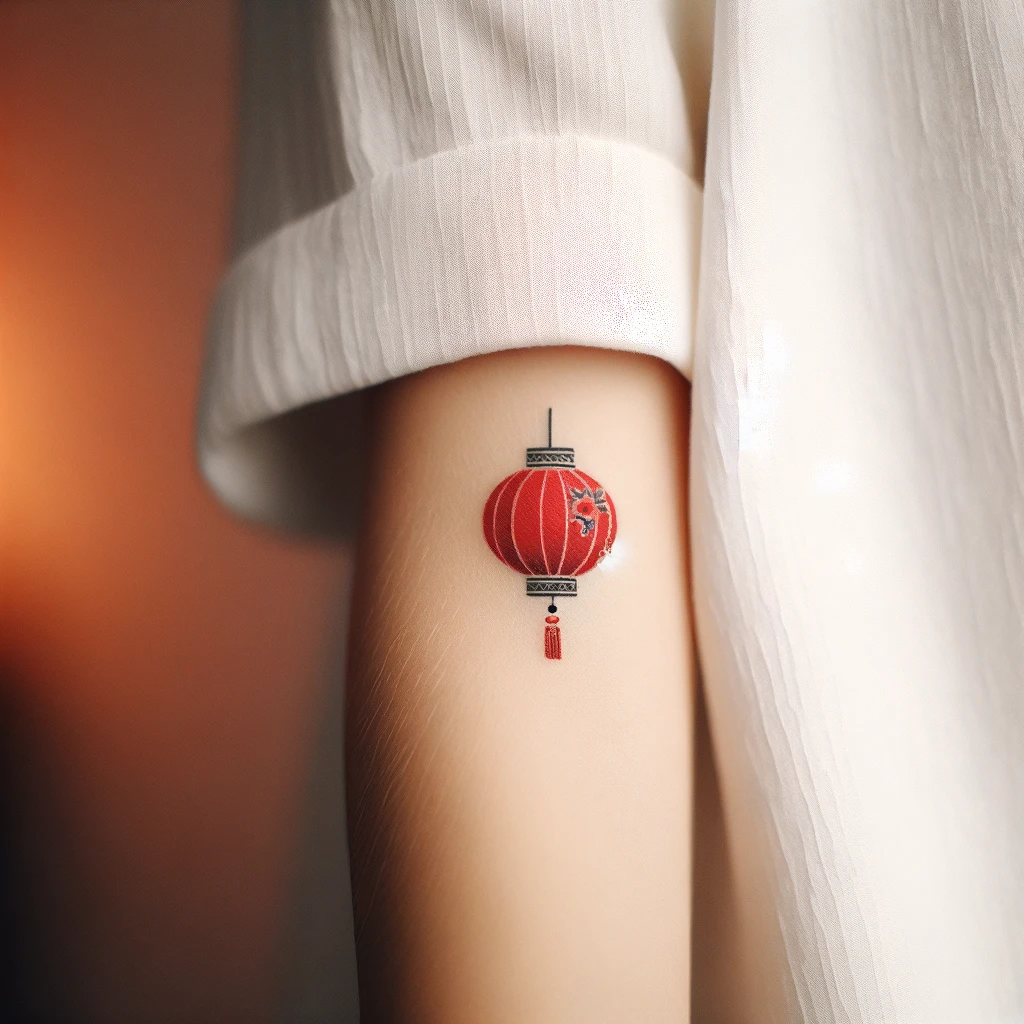
Water (水 – Shuǐ)
In Chinese philosophy, water symbolizes adaptability, strength, and persistence. It has the power to flow around obstacles and yet can carve through the hardest stone over time. A tattoo of water can represent flexibility in life, the strength to overcome challenges, and the persistence to achieve one’s goals. It’s a reminder of the power of gentleness combined with strength.
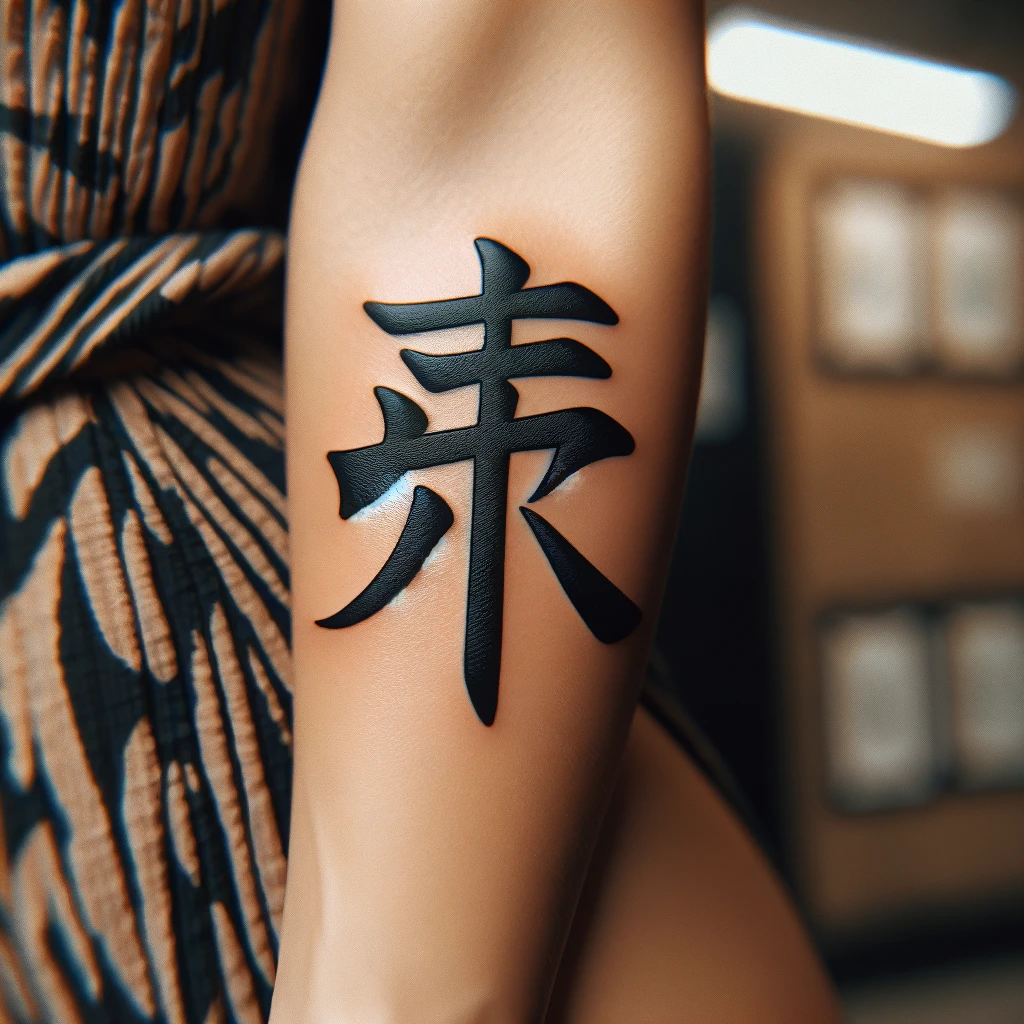
Pine Tree (松树 – Sōngshù)
The pine tree is a symbol of longevity, virtue, and immortality in Chinese culture. It remains green throughout the year and can live for thousands of years, symbolizing endurance and the ability to withstand hard times. A tattoo of a pine tree can represent eternal youth, resilience, and the strength to stand firm in the face of adversity.
Chinese Lantern (提灯 – Tídēng)
Different from the red lantern, a Chinese lantern in a broader sense symbolizes illumination, protection from evil, and the guidance of lost spirits. It’s often used in festivals to light up the night sky. A tattoo of a Chinese lantern can represent a guiding light in darkness, hope, and the celebration of life.
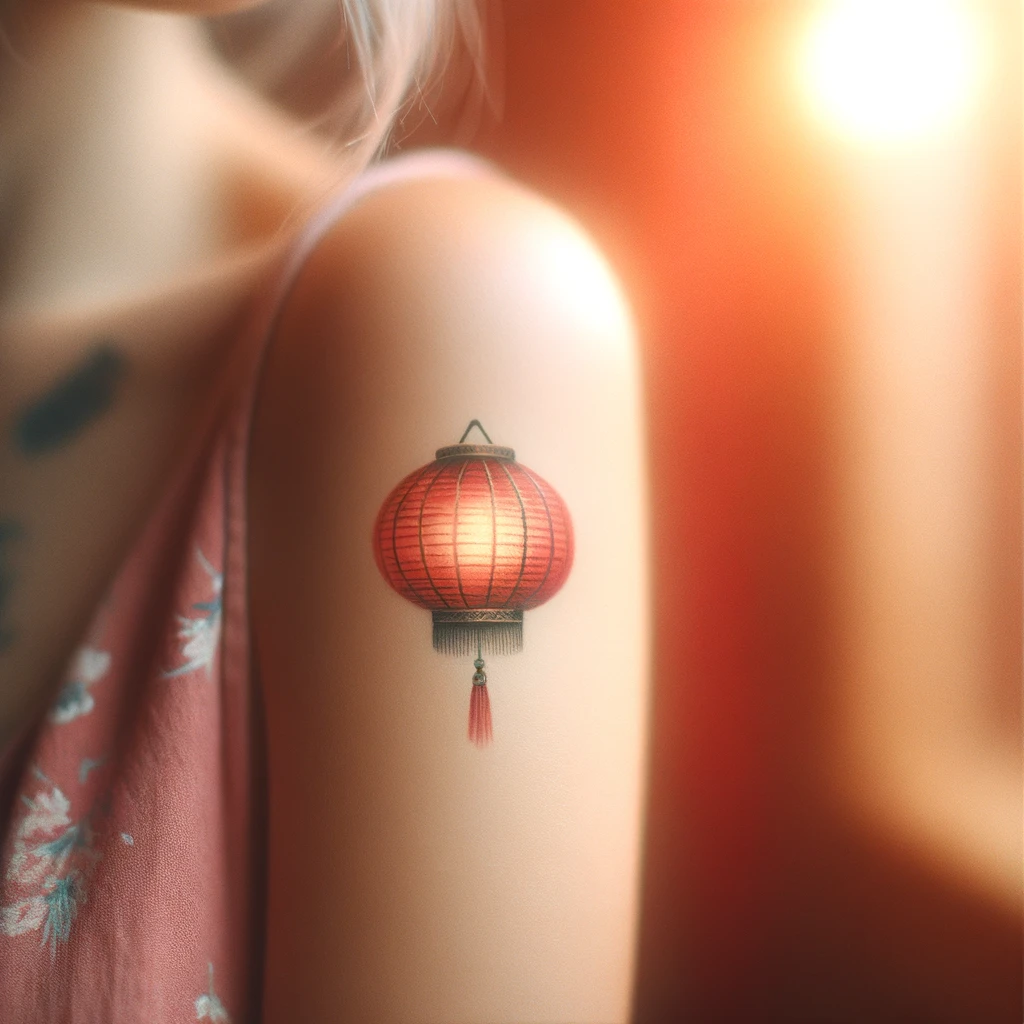
The Great Wall (长城 – Chángchéng)
The Great Wall of China is not only a marvel of engineering but also a symbol of the resilience and enduring strength of the Chinese people. A tattoo of the Great Wall can symbolize personal boundaries, strength to protect oneself and loved ones, and the ability to overcome obstacles through perseverance.
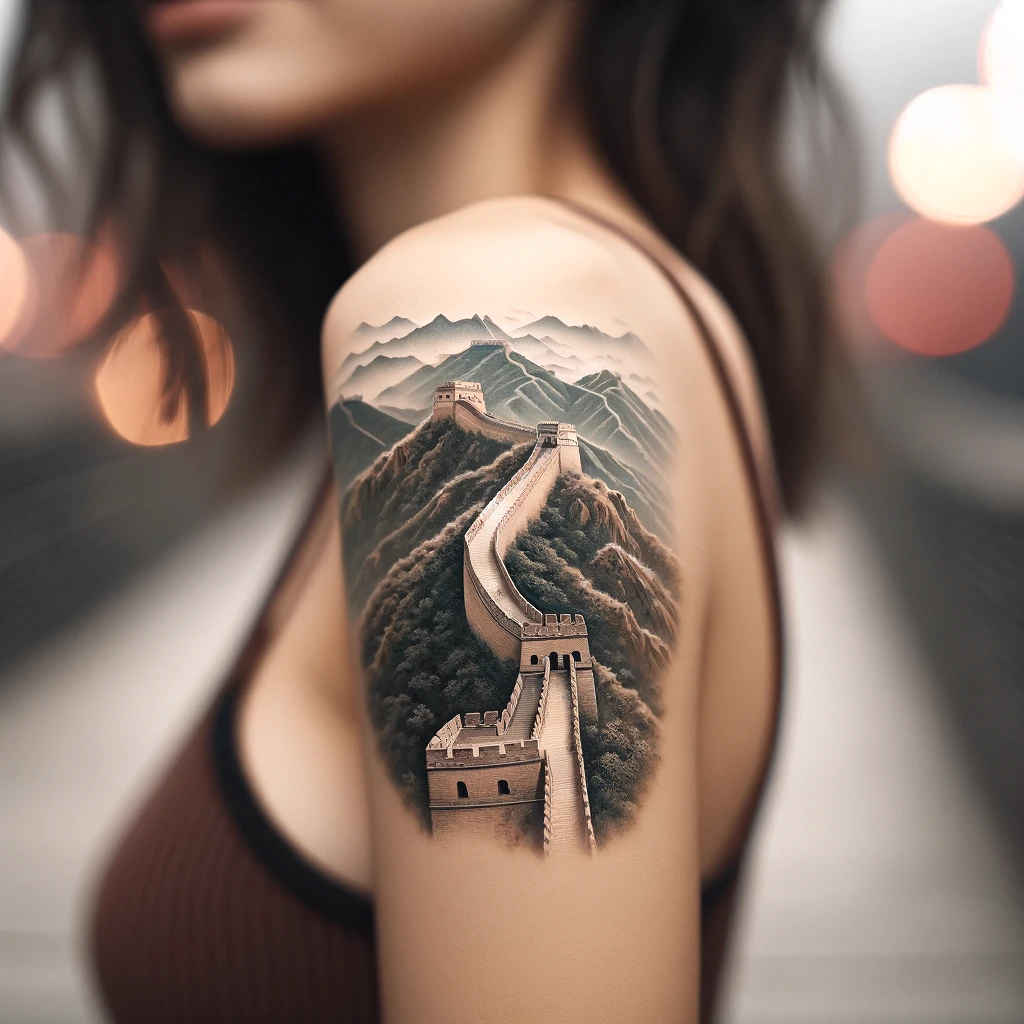
Ink Brush (毛笔 – Máobǐ)
The ink brush is a traditional tool for Chinese calligraphy and painting, symbolizing culture, education, and the art of writing. A tattoo of an ink brush can represent a love for art, the importance of knowledge and education, and a connection to traditional values.
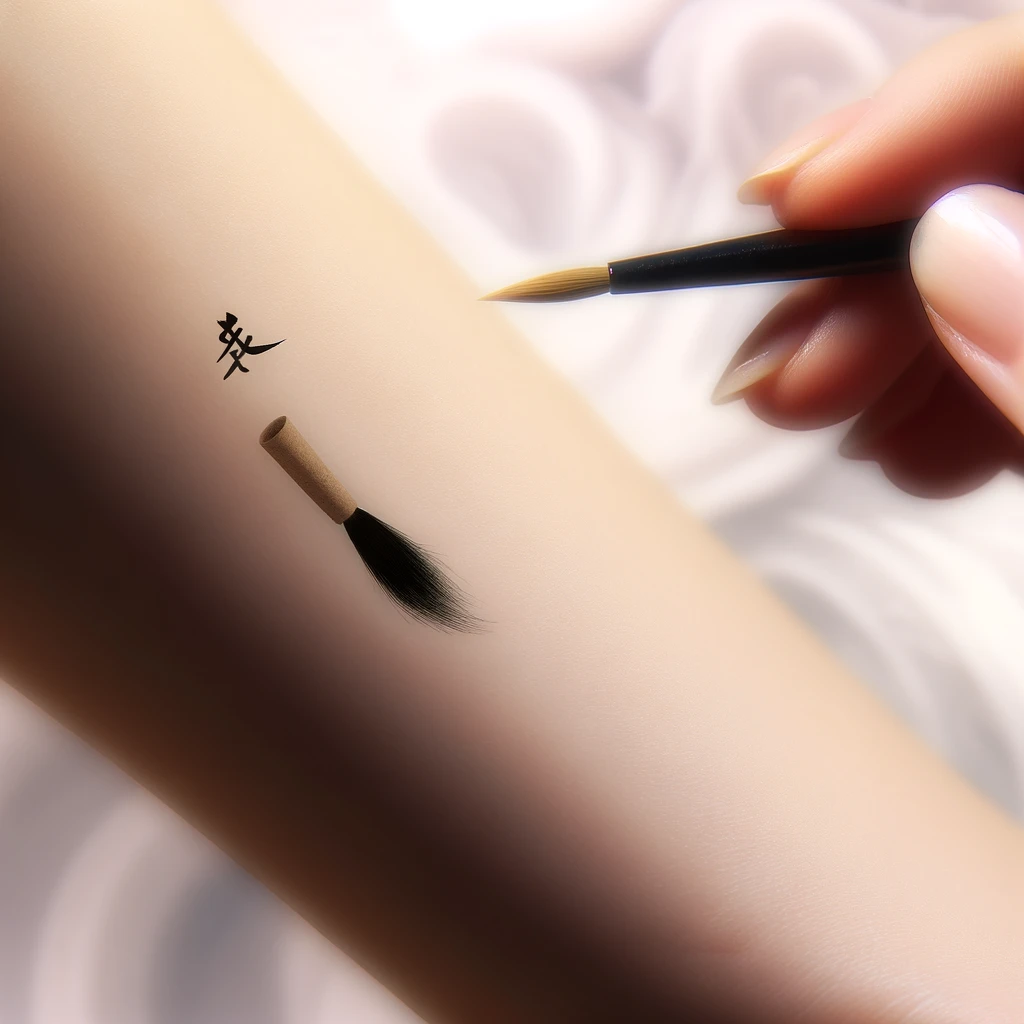
Moon (月亮 – Yuèliàng)
The moon holds significant meaning in Chinese culture, often associated with femininity, tranquility, and the cyclical nature of life. It symbolizes the yin aspect, offering balance. A moon tattoo can represent quiet strength, the beauty of the natural world, and the phases of life and personal growth.
Jade (玉 – Yù)
Jade is highly valued in Chinese culture for its beauty and symbolic meanings, including purity, moral integrity, and protection. A jade tattoo might symbolize a strong character, the value of inner peace, and protection against harm.

Wind (风 – Fēng)
In Chinese culture, wind symbolizes change, freedom, and the invisible force of life. It’s often associated with the ability to move freely and effortlessly through the world. A tattoo of wind elements can signify adaptability, the embrace of change, and the natural flow of life.
Sun (日 – Rì)
The sun is a powerful symbol in many cultures, including Chinese, representing vitality, growth, and the yang principle of masculinity and light. A sun tattoo can symbolize energy, creativity, and the force of life, illuminating the path forward.

